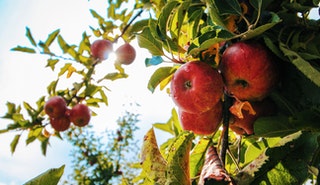Low-flavanol diet linked to age-related memory loss
30 May 2023

A diet low in flavanols – compounds found in many foods such as tea, apples and berries – is linked to age-related memory loss, according to a large randomised controlled trial in older adults.
The research published in today's issue of PNAS explores the impact of flavanols on cognitive ageing in 3562 older individuals over three years. The study's findings show that individuals with high habitual flavanol consumption have a better hippocampal memory function, which is responsible for one aspect of cognitive ageing, than those with lower flavanol consumption. However, an intervention of 500mg of flavanols daily can reverse the negative effects of low flavanol intake and improve memory function in these individuals.
Lead investigator Scott Small MD, Professor of Neurology at Columbia University said: “The identification of nutrients critical for the proper development of an infant’s nervous system was a crowning achievement of 20th century nutrition science.
“As we are living longer, research is starting to reveal that different nutrients are needed to fortify our ageing minds.”
Co-lead, Adam Brickman, Professor of Neuropsychology at Columbia University added: “The improvement among study participants with low-flavanol diets was substantial and raises the possibility of using flavanol-rich diets to improve cognitive function in older adults.”
Gunter Kuhnle, Professor of Nutrition and Food Science at the University of Reading and co-investigator of the study, said: "These are exciting results because they suggest that there is an optimum amount of flavanols in the diet.
“We used nutritional biomarkers in urine to measure the baseline diet of around one-third of the participants. This method is more accurate than relying on self-reported diet and provided us with a better estimate of flavanol intake and its association with memory function.”
This research was part of the COSMOS study (Cocoa Supplement and Multivitamin Outcomes Study), a double-blind, placebo controlled randomised study of more than 21,000 participants over three years. In contrast to many other studies, which rely on foods as source of flavanols, the COSMOS study used a standardised flavanol extract. This allowed a better control of the intervention and made it possible to attribute any effects to flavanols and not specific foods. This study already showed that flavanols reduce the risk of cardio-vascular diseases.
Professor Kuhnle said: “The results show the importance of considering bioactive compounds when developing official dietary guidelines. While these compounds are not essential like vitamins, some of them, like flavanols, are important for health. This is very similar to fibre, which is not an essential nutrient but important to lower the risk of heart disease and cancer. Results from this study - and data from the main COSMOS trial and other studies - clearly show that a low flavanol intake has a detrimental effect on health.
JoAnn Manson MD leads the COSMOS parent trial, along with Dr Howard Sesso at Brigham and Women’s Hospital. She said: “COSMOS-Web is a model for the synergy possible between observational research and gold-standard randomized trials; here, baseline low flavanol intake tracked with relatively lower memory and randomized supplementation with cocoa flavanols was shown to reverse the lower memory.”
The flavanol-based intervention in the study used flavanols extracted from cocoa, but the study authors point out that eating chocolate is unlikely to provide sufficient levels of flavanols to affect cognitive function, as most flavanols are destroyed during traditional processing of cocoa when making chocolate.
The good news for the UK is that on average, most older adults consume high amounts of flavanols that are comparable with the group that received the 500mg per day supplement. The main sources of flavanols in the British diet are tea, apples and berries. Making some small dietary changes can boost intake to the recommended amounts and protect cognitive health into older age.
The study, titled “Dietary flavanols restore hippocampal-dependent memory in older adults with lower diet quality and habitual flavanol consumption,” is published in 'Proceedings of the National Academy of Sciences'.
https://doi.org/10.1073/pnas.2216932120

